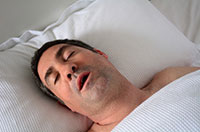The Daily Grind: Teeth Clenching During the Day and What to Do About It
November 25th, 2016
 Have you experienced a tight jaw, impressions on your tongue or a tooth that seemed loose, chipped, or fractured? What about sore facial muscles, increased sensitivity in your teeth, or a partner that complains about clicking noises you make with your mouth? If you said yes to all or most of these, you could be a teeth grinder. Read on to find out why teeth grinding is harmful, what causes it, and what you can do to stop grinding and clenching your teeth during the day.
Have you experienced a tight jaw, impressions on your tongue or a tooth that seemed loose, chipped, or fractured? What about sore facial muscles, increased sensitivity in your teeth, or a partner that complains about clicking noises you make with your mouth? If you said yes to all or most of these, you could be a teeth grinder. Read on to find out why teeth grinding is harmful, what causes it, and what you can do to stop grinding and clenching your teeth during the day.
Why You Should Be Concerned About Teeth Grinding
Teeth grinding or clenching, known medically as bruxism, is common in both adults and children. It could result in further teeth sensitivity as grinding wears down your enamel. If bruxism persists, you could end up damaging your teeth and it may require treatments such as root canals, bridges, or even dentures and implants.
Bruxism could also affect your jaw—teeth grinding might cause TMJ or even disfigure your face. You could experience headaches and earaches that you may not immediately associate with bruxism.
Grinding and Clenching—Why Does It Happen During the Day?
While doctors are not entirely sure what causes teeth grinding, common causes include sleep disorders such as obstructive sleep apnea (OSA) or abnormalities in your teeth alignment (malocclusion). Many cases of teeth grinding and clenching happen at night, and can only be detected if your loved one notices it enough to wake him up.
But teeth grinding also happens during the day (daytime bruxism) and it is likely caused by anxiety and emotional stress. If you have daytime bruxism, you don’t necessarily experience nocturnal bruxism as well. Fortunately, there are means to stop bruxism before it wreaks havoc on your teeth.
How to Break the Habit
Try the following tips to help you eliminate teeth grinding during the day:
- Reduce stress and tension by doing the following:
- Keep a journal or writing pad handy. When you start to feel stressed out, take a few minutes to jot down your thoughts and feelings. This lets you release emotionally, and you can process it later to identify your stressors.
- Seek counsel. A trained professional will use different techniques such as cognitive behavioral therapy to deal with your stressors and help you cope with emotional situations.
- Increased physical activity is proven to lower stress. Remember to stay hydrated.
- Avoid certain food and beverages that may trigger stress, such as caffeinated drinks (coffee, soda, etc.) and alcohol
- Under more extreme cases, use muscle relaxants as prescribed by your doctor.
- Avoid chewing gum, the tip of your pen, your pencil eraser, or other objects. Chewing will only encourage teeth grinding during the day.
- Use a mouth guard. This is especially important if you grind your teeth at night and you’re not aware. But mouth guards can also be helpful during the day if you’re still training your jaw. Daytime mouth guards are not as noticeable as night guards, so it appears discreet and allows you to talk comfortably.
- Talk to people you regularly interact with. During the night, ask your bed mate to gently wake you up so you can relax and stop grinding your teeth. During the day, ask people to help remind you not to grind or clench. Self-awareness is important to stop daytime bruxism but employ the help of others if you can’t catch yourself doing it.
- If you notice that you’re clenching, keep lips together, keep teeth slightly apart, and place the tip of your tongue between your teeth. This technique helps your jaw relax and eventually train you not to grind your teeth.
We hope these tips help you keep your daytime grinding in check! If you need any other tips or are interested in getting your teeth looked at, don’t hesitate to visit Chicago’s number one dentistry. Contact us today!

 Sleep apnea is a disorder in which breathing repeatedly starts and stops during sleep. Snoring loudly is a common symptom, but it's not the only sign – and snoring doesn't necessarily indicate sleep apnea. Dentists tend to be the first doctors to identify a sleep apnea problem in their patients, since people tend to visit dentists more frequently than physicians.
Sleep apnea is a disorder in which breathing repeatedly starts and stops during sleep. Snoring loudly is a common symptom, but it's not the only sign – and snoring doesn't necessarily indicate sleep apnea. Dentists tend to be the first doctors to identify a sleep apnea problem in their patients, since people tend to visit dentists more frequently than physicians.




 Website Powered by Sesame 24-7™
Website Powered by Sesame 24-7™